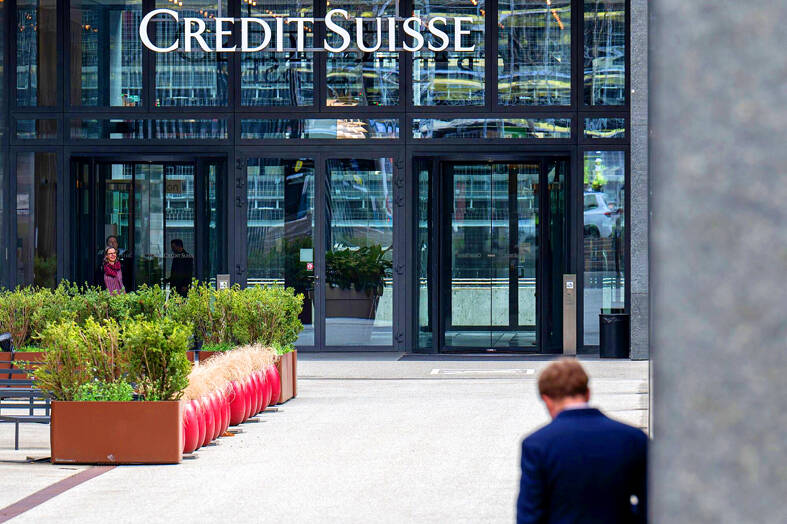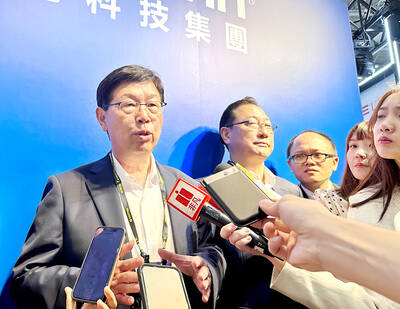Credit Suisse Group AG told staff its wealth assets are operationally separate from UBS Group AG for now, but once merged, clients might want to consider moving some assets to another bank if concentration was a concern, an internal memo on Sunday said.
The memo provided talking points to Credit Suisse staff for client conversations after a historic Swiss-backed acquisition of the troubled bank by UBS.
“For now, assets are still legally separated. Once that changes, you [clients] may of course want to consider moving some of your assets to another bank if concentration is a concern,” the memo said.

Photo: Pascal Mora, Bloomberg
That response was suggested to Credit Suisse staff if they were asked by clients what they should do if they were also a UBS client and wanted to avoid asset concentration, which can be a concern for wealthy customers.
In a package orchestrated by Swiss regulators on Sunday, UBS is to pay US$3.25 billion for 167-year-old Credit Suisse and assume up to US$5.4 billion in losses.
The deal makes UBS the undisputed global leader in managing money for wealthy clients through the takeover of its main rival, triggering some concerns about concentration risks for clients.
The memo also told staff to inform clients that plans for its investment banking business are to be communicated in due as the deal continues to be worked out.
“We do not expect there to be any disruption to client services. We are fully focused on ensuring a smooth transition and seamless experience for our valued clients and customers,” a Credit Suisse spokesperson said.
Credit Suisse is proceeding with its annual Asia Investment Conference in Hong Kong tomorrow, the spokesperson said, adding that the event would be closed to media.
A separate memo on Sunday said the bank told employees that its operations were unaffected after it agreed to the UBS takeover.
“Our branches and our global offices will remain open, and all colleagues are expected to and should continue to come to work,” Credit Suisse said in the memo.
A number of major banks including Societe Generale SA and Deutsche Bank AG are restricting new trades involving Credit Suisse or its securities, sources said.
Regarding counterparties having stopped business with Credit Suisse, the bank said in the client talking-points memo that it believes the transaction “will help to restore confidence to the financial markets more broadly.”
Market players remain concerned about the next moves at Credit Suisse and the impact on employees, investors and clients.
Credit Suisse told staff that promised bonuses and pay increases would be paid as the bank seeks to keep “business as usual.”
The lender said that it would cautiously identify which roles might be affected, and “will aim to continue to provide severance in line with market practice.”
“The merger is expected to close by the end of 2023 and until such time we will continue to operate as close as possible to ‘business as usual,’ focused on serving our clients,” Credit Suisse said.
Additional reporting by Bloomberg

Taiwan Transport and Storage Corp (TTS, 台灣通運倉儲) yesterday unveiled its first electric tractor unit — manufactured by Volvo Trucks — in a ceremony in Taipei, and said the unit would soon be used to transport cement produced by Taiwan Cement Corp (TCC, 台灣水泥). Both TTS and TCC belong to TCC International Holdings Ltd (台泥國際集團). With the electric tractor unit, the Taipei-based cement firm would become the first in Taiwan to use electric vehicles to transport construction materials. TTS chairman Koo Kung-yi (辜公怡), Volvo Trucks vice president of sales and marketing Johan Selven, TCC president Roman Cheng (程耀輝) and Taikoo Motors Group

Among the rows of vibrators, rubber torsos and leather harnesses at a Chinese sex toys exhibition in Shanghai this weekend, the beginnings of an artificial intelligence (AI)-driven shift in the industry quietly pulsed. China manufactures about 70 percent of the world’s sex toys, most of it the “hardware” on display at the fair — whether that be technicolor tentacled dildos or hyper-realistic personalized silicone dolls. Yet smart toys have been rising in popularity for some time. Many major European and US brands already offer tech-enhanced products that can enable long-distance love, monitor well-being and even bring people one step closer to

RECORD-BREAKING: TSMC’s net profit last quarter beat market expectations by expanding 8.9% and it was the best first-quarter profit in the chipmaker’s history Taiwan Semiconductor Manufacturing Co (TSMC, 台積電), which counts Nvidia Corp as a key customer, yesterday said that artificial intelligence (AI) server chip revenue is set to more than double this year from last year amid rising demand. The chipmaker expects the growth momentum to continue in the next five years with an annual compound growth rate of 50 percent, TSMC chief executive officer C.C. Wei (魏哲家) told investors yesterday. By 2028, AI chips’ contribution to revenue would climb to about 20 percent from a percentage in the low teens, Wei said. “Almost all the AI innovators are working with TSMC to address the

FUTURE PLANS: Although the electric vehicle market is getting more competitive, Hon Hai would stick to its goal of seizing a 5 percent share globally, Young Liu said Hon Hai Precision Industry Co (鴻海精密), a major iPhone assembler and supplier of artificial intelligence (AI) servers powered by Nvidia Corp’s chips, yesterday said it has introduced a rotating chief executive structure as part of the company’s efforts to cultivate future leaders and to enhance corporate governance. The 50-year-old contract electronics maker reported sizable revenue of NT$6.16 trillion (US$189.67 billion) last year. Hon Hai, also known as Foxconn Technology Group (富士康科技集團), has been under the control of one man almost since its inception. A rotating CEO system is a rarity among Taiwanese businesses. Hon Hai has given leaders of the company’s six